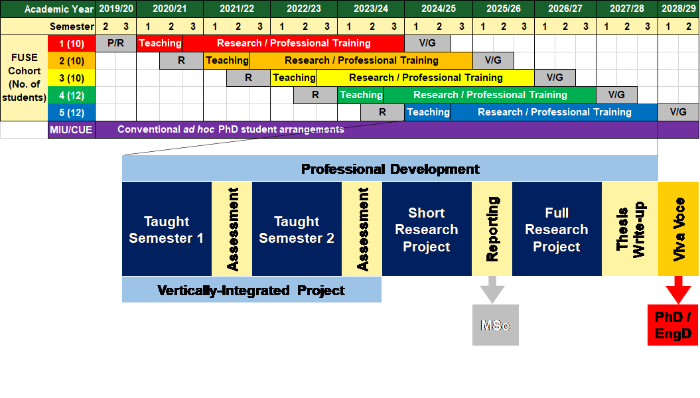Programme
FUSE training is the first such ultrasonic engineering programme in the world. The research degree for each student usually spans four years. The first 12 months, starting with an Induction Week, contain two taught semesters for full time students including a vertically-integrated project (VIP) with formal assessment, followed by a four-month Short Research Project (including formal reporting). This is followed by 36 months on the Full Research Project, including the thesis.
A globally unique training programme
We welcome part-time students, supporting them individually as part of our Equality, Diversity and Integration Action Plan. Most importantly, interaction with full-time peers and other research students in MIU and CUE will be maximised to play a full part in FUSE.
The Short and Full Research Projects normally have related topics, with at least one external partner, to allow each student to initiate, confirm and deepen activity in a preferred subspecialism.
As the University of Glasgow and the University of Strathclyde are geographically close (2 miles apart), taught courses are provided on both sites during both semesters, with travel time allowed for the 30-minute journey between the two locations. All students are formally registered at the University of Glasgow for the first 12 months and each student then registers at the most appropriate university to undertake their full research project for Months 13–48.

Semester 1 runs September to December, Semester 2 runs January to May. In order to progress, a student must have acquired 180 credits. Each course and project is worth a number of credits, indicated in brackets below. EngD students need to complete an additional 40 credits of business and management related training in Yrs 2-4
*Current programme:
|
Semester |
Course Title |
Course ID |
University of… |
Credits |
|
1 |
Ultrasonics Technology and Applications |
ENG5302 |
Glasgow |
10 |
|
1 |
Ultrasonic Engineering Case Study |
ENG5328 |
Glasgow |
10 |
|
1 |
Digital Signal Processing |
EE969* |
Strathclyde |
10 |
|
1 |
Image and Video Processing |
EE981* |
Strathclyde |
10 |
|
1 + 2 |
Sensor Technologies |
EE987 |
Strathclyde |
20 |
|
1 + 2 |
Vertically Integrated Project |
ENG5320 |
Glasgow |
20 |
|
2 |
Advanced Ultrasonics |
ENG5316 |
Glasgow |
10 |
|
2 |
Materials Technologies |
ENG5318 |
Glasgow |
10 |
|
2 |
Research Methods |
CS957 |
Strathclyde |
10 |
|
2 |
Experiments in Ultrasonic Engineering | ENG5317 | Glasgow | 10 |
Semester 1 and 2:
- Vertically Integrated Project (20)
The VIP approach matches industry’s span of technical coverage and seniority in many projects. Each cohort of 1st year FUSE students divides into 3 groups, each forming part of a vertically integrated team. The other 10 – 15 team members are drawn from 4th / 5th year undergraduates, other FUSE cohorts, MIU / CUE PhD students and postdoctoral researchers, with competitive student selection. Each VIP is co-created by academics, students and external partners, with the 3 projects each year covering different end-uses.
Semester 3 (Jun-Sept):
- Mini Project (60)
Each student selects the topic of their Short Research Project in Months 5 – 6 from a list co-created by academic supervisors and external partners. Careful allocation is important as many of the short projects will lead into Full Research Projects. Each topic is presented by the academic and external supervisors at an open Project Information event that all students attend. Students prioritise their choices before final allocation.
Research Project
A FUSE student may gain either a PhD or an EngD. A PhD involves a single project, or a set of projects following a single pathway. PhD students work in either university, or between them, and may spend periods of several weeks with external partners. An EngD may involve a set of projects within a single area, or a portfolio of short projects in a broader area. EngD students spend, typically, 50 - 75% of their time with an external partner.
Every PhD or EngD has at least one external partner, drawn from the total of more than 30 already committed to FUSE and from others who will join the community. Each external partner contributes to creation of the research topic and provides on-going mentoring and supervision. As well as submitting to the annual progress review mechanisms of each university, according to where they are registered, each student gives and presentation or a poster at the FUSE annual research meeting. These are organised by the students themselves.
Professional Skills
Alongside technical training, FUSE students benefit from a professional skills programme including key topics such as data management, time management, and communications in their first year and topics aimed at enhancing impact. Professional skills training forms part of the formal training in the first year and via continuous professional development for the duration of the studentship. The courses include input from external partners to match the skills demanded of future technology leaders. Students are supported to own their development, including through practical work in public engagement / impact.

